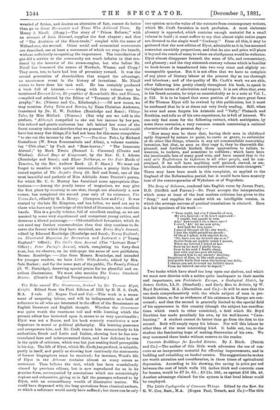The Boke named The Gouernour, deuised by Sir Thomas Elyot,
Knight. Edited from the First Edition of 1531 by H. H. S. Croft, M.A. 2 vols. (C. Kegan Paul and Co).—This work is a monu- ment of unsparing labour, and will be indispensable as a book of reference to all who are interested in the effect of the Renaissance on English literature and English thought. Whether the Gouernour was quite worth the enormous toil and wide learning which the present editor has bestowed upon it, seems to us very questionable ; Elyot was not a Bacon, and his book scarcely constitutes a new departure in moral or political philosophy. His learning possesses and overpowers him, and Mr. Croft traces him remorselessly to his authorities, Greek and Latin and Italian, showing how he has mis- translated here and misrepresented there, and how deficient he was in the spirit of criticism, which was but just making itself perceptible in his day. The life of Elyot, which Mr. Crofkhas prefixed, is valuable, partly in itself, and partly as showiag how cautiously the statements of former biographers must be received ; for instance, Wood's life of Elyot in the Athenae contains almost as many errors as sentences. Then follows the text, which has been scandalously abused by previous editors, but is now reproduced for us in its genuine form, accompanied by annotations which are astonishingly copious and exhaustive, giving us in fall the passages referred to by Elyot, with an extraordinary wealth of illustrative matter. We .could have dispensed with the long quotations from classical authors, to which a reference would surely have sufficed ; but there can be only
one opinion as to the value of the extracts from contemporary writers, which Mr. Croft furnishes in such profusion. A most elaborate glossary is appended, which contains enough material for a small volume in itself; it must suffice to say that almost eight entire pages are devoted to the single word "Cockney." From all this, it may be gathered that the new edition of Elyot, admirable as it is, has assumed somewhat unwieldy proportions, and that its size and price will place it beyond the reach of many to whom an abridgment would be welcome. Elyot almost disappears beneath the mass of life, and commentary, and glossary ; and the tiny sixteenth-century volume which is familiar to book-lovers is transformed into two very stout and slightly un- manageable quartos. But it is not often that we have to complain of any piece of literary labour at the present day as too thorough and laborious ; and of the quality of Mr. Croft's work we are able, after following him pretty closely throughout his book, to speak in the highest terms of admiration and respect. It is not often that, even in his Greek accents, he trips so unmistakably as in a note at Vol. I., p. 112. It is to be hoped that some portion of the once great fame of Sir Thomas Elyot will be revived by this publication, but it must be confessed that he is at times not very lively reading. Still, when he ever and anon forgets his Aristotle and "Tally," Plutarch and Boethins, and tells us of his own experience, he is full of interest. We can only find room for the following extract, which anticipates, by some three centuries, a very common remark concerning a national characteristic of the present day :—
"How many men be there that, having their sons in childhood aptly disposed by nature to paint, to carve or grave, to embroider or do other like things, wherein is any art commendable concerning invention, but that, as soon as they espy it, they be therewith dis- pleased, and forthwith bindeth them apprentices to tailors, to weavers, to tuckers, and sometime to cobblers ; which have been the inestimable loss of many good wits, and have caused that in the said arts Englishmen be inferiors to all other people, and be con- strained, if we will have anything well painted, carved, or em- broidered, to abandon our own countrymen and resort unto strangers."
There may have been much in this complaint, as applied to the England of the Reformation period, but it would have been scarcely true of the contemporaries of Wykeham or of Waynflete.
The Song of Solomon, rendered into English verse by James Pratt, D.D. (Griffith and Farran.)—Dr. Pratt accepts the interpretation which some at least of the best modern criticism has given to the "Song," and supplies the reader with an intelligible version, in which the average success of poetical translations is attained. Here is a fair specimen of his work :—
'Twas night, but e'er I thought of rest,
My own beloved—w th heart oppressed—
I sought, but sought in vain.
Alas how could I do e these eyes ?
I cried, ' Ah let me now arise, And look for him again.'
I passed through all the city wards, I met the night-patrolling guards ; Of than I asked, with anguish keen.
Oh, have yen my beloved one seen ?'
Scarce from my nightly watch I passed, When my beloved I found at last.
Soon on his neck I gladly hung.
Soon to his neck I fondly clung,
And with rap, are past all telling Brought him to my parents' dwelling. Daughters of Zion, by the swift gazelles, And gentle hinds that roam throughout our dells, I charge you not to tempt my faithful heart
From my beloved one ever to depart."






































 Previous page
Previous page